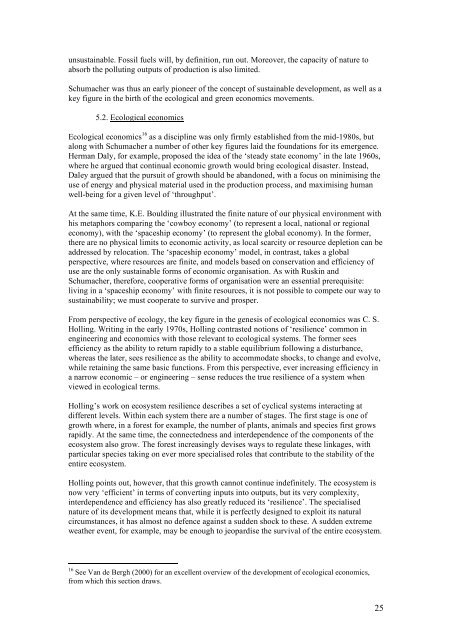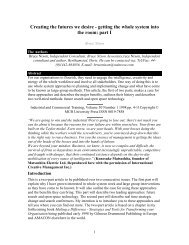From Old Economics to New Economics- Radical ... - Bruce Nixon
From Old Economics to New Economics- Radical ... - Bruce Nixon
From Old Economics to New Economics- Radical ... - Bruce Nixon
Create successful ePaper yourself
Turn your PDF publications into a flip-book with our unique Google optimized e-Paper software.
unsustainable. Fossil fuels will, by definition, run out. Moreover, the capacity of nature <strong>to</strong><br />
absorb the polluting outputs of production is also limited.<br />
Schumacher was thus an early pioneer of the concept of sustainable development, as well as a<br />
key figure in the birth of the ecological and green economics movements.<br />
5.2. Ecological economics<br />
Ecological economics 16 as a discipline was only firmly established from the mid-1980s, but<br />
along with Schumacher a number of other key figures laid the foundations for its emergence.<br />
Herman Daly, for example, proposed the idea of the ‘steady state economy’ in the late 1960s,<br />
where he argued that continual economic growth would bring ecological disaster. Instead,<br />
Daley argued that the pursuit of growth should be abandoned, with a focus on minimising the<br />
use of energy and physical material used in the production process, and maximising human<br />
well-being for a given level of ‘throughput’.<br />
At the same time, K.E. Boulding illustrated the finite nature of our physical environment with<br />
his metaphors comparing the ‘cowboy economy’ (<strong>to</strong> represent a local, national or regional<br />
economy), with the ‘spaceship economy’ (<strong>to</strong> represent the global economy). In the former,<br />
there are no physical limits <strong>to</strong> economic activity, as local scarcity or resource depletion can be<br />
addressed by relocation. The ‘spaceship economy’ model, in contrast, takes a global<br />
perspective, where resources are finite, and models based on conservation and efficiency of<br />
use are the only sustainable forms of economic organisation. As with Ruskin and<br />
Schumacher, therefore, cooperative forms of organisation were an essential prerequisite:<br />
living in a ‘spaceship economy’ with finite resources, it is not possible <strong>to</strong> compete our way <strong>to</strong><br />
sustainability; we must cooperate <strong>to</strong> survive and prosper.<br />
<strong>From</strong> perspective of ecology, the key figure in the genesis of ecological economics was C. S.<br />
Holling. Writing in the early 1970s, Holling contrasted notions of ‘resilience’ common in<br />
engineering and economics with those relevant <strong>to</strong> ecological systems. The former sees<br />
efficiency as the ability <strong>to</strong> return rapidly <strong>to</strong> a stable equilibrium following a disturbance,<br />
whereas the later, sees resilience as the ability <strong>to</strong> accommodate shocks, <strong>to</strong> change and evolve,<br />
while retaining the same basic functions. <strong>From</strong> this perspective, ever increasing efficiency in<br />
a narrow economic – or engineering – sense reduces the true resilience of a system when<br />
viewed in ecological terms.<br />
Holling’s work on ecosystem resilience describes a set of cyclical systems interacting at<br />
different levels. Within each system there are a number of stages. The first stage is one of<br />
growth where, in a forest for example, the number of plants, animals and species first grows<br />
rapidly. At the same time, the connectedness and interdependence of the components of the<br />
ecosystem also grow. The forest increasingly devises ways <strong>to</strong> regulate these linkages, with<br />
particular species taking on ever more specialised roles that contribute <strong>to</strong> the stability of the<br />
entire ecosystem.<br />
Holling points out, however, that this growth cannot continue indefinitely. The ecosystem is<br />
now very ‘efficient’ in terms of converting inputs in<strong>to</strong> outputs, but its very complexity,<br />
interdependence and efficiency has also greatly reduced its ‘resilience’. The specialised<br />
nature of its development means that, while it is perfectly designed <strong>to</strong> exploit its natural<br />
circumstances, it has almost no defence against a sudden shock <strong>to</strong> these. A sudden extreme<br />
weather event, for example, may be enough <strong>to</strong> jeopardise the survival of the entire ecosystem.<br />
16 See Van de Bergh (2000) for an excellent overview of the development of ecological economics,<br />
from which this section draws.<br />
25



